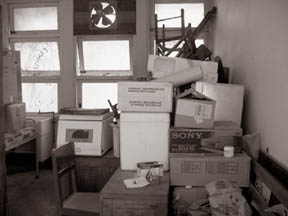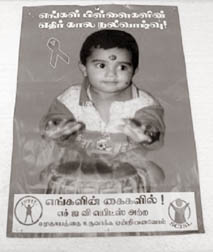|
observer |
|
|
|
|
|
OTHER LINKS |

|

|

|
Report on HIV in Jaffna: A journey to Jaffna
Jaffna, situated in the Northern part of Sri Lanka has been completely destroyed during the two decades of civil war between the government and the Liberation Tigers of Tamil Eelam (LTTE). Although the community is supposedly in peace, the possibilities of violent conflict remains an ongoing possibility. A journey to this island reveals that the population is highly vulnerable to HIV, yet civic infrastructure is almost non existent. According to a survey conducted by Jaffna Kachcheri in 2004 the total population of the Jaffna District is 584,667 of which 277,973 are men and 306,694 women. The number of women is more because of the presence of a large number of war widows. Recent reportsAccording to recent reports, Jaffna district has the second highest number of people living with HIV after Colombo district. The first case of HIV was detected in 1993. To date the accumulated number of people living with HIV and AIDS is 38, while those living with HIV is 16. Out of these, two are children. There are more of females than males living with HIV/AIDS. The community is conservative. Cultural restrictions inhibit a frank discussion on sex, sexuality and HIV/AIDS. Interviews revealed that community members are in a stage of denial on the existence of HIV in their community. One community member informed, "HIV/AIDS is not a problem in our society, it is a Western disease .We do not misbehave like others". Yet AIDS is the leading cause of death in Jaffna, followed by cancer and rabies.
There are a large number of Sri Lankan refugees in the peninsula who have returned from refugee camps in India. The cramped living conditions and poverty make many in the refugee camp vulnerable to HIV. There are a number of sex workers in Jaffna. Majority of these women are from below the poverty line. One sex worker informs, "sex work fetches us more than what a vegetable seller earns in a market, per day. Therefore, many women are entering this trade." They get arrested and are produced before the courts, but go back to the same business. Though no baseline study has been conducted on the prevalence of sex work in the area, anecdotal records reveal that the number of sex workers are rising in certain areas. A community member informs, "It is estimated that there are 36,000 war widows in the Jaffna district. Where do they go to satisfy their sexual needs? This is one of the other reasons for the sex workers being on the increase in the district" There are forty thousand military personnel from the Government of Sri Lanka, currently stationed in the Jaffna peninsula. Jaffna is the first posting for a young officer who joins the army and he cannot take leave for a period of one year while on duty, in Jaffna. With the advances in technology, the sex workers are easily accessible on the mobile. Almost all have mobile telephones and communicate with their clients on mobiles. A community member informs, "young people in the age group of 20 years to 24 years in the coastal belt from Kozhumbuthurai to Navanthurai move around a lot" Stigma and discrimination against those living with HIV is very high inhibiting PLWHA's access to services. The governmental response is still weak, as infrastructure is being rebuilt. The Jaffna Teaching Hospital is the only teaching hospital in Jaffna. There are four base hospitals, namely Manthikai, Chavakachcheri, Sankanai and Kayts. Apart from these there are rural hospitals, central dispensaries and private hospitals. Though the concentration of the private hospitals is high, and the government hospitals lack many facilities, patients prefer to access government hospitals, because of free service. Patients report that the needs of those with clout are met easily while others have to wait for a long time. The patients from the lower income groups and the sex workers are treated with disdain. All these factors force those who can afford to access the private hospitals or go to Colombo. There is only one STD clinic, responsible for HIV prevention and control activities at the Jaffna Teaching hospital. Currently there is no doctor in the clinic. A doctor who was posted to the clinic left as there was no infrastructure and support available. There is also no Medical Laboratory Technician (MLT) at the STD clinic. The MLT from the blood bank conducts the necessary tests for HIV. But it takes two months to get the results, because the confirmatory test can only be done at the National Hospital in Colombo. Although he is not qualified, the PHI is forced to play the doctor's role. IsolatedThe STD clinic is situated far from the main entrance. People who have visited the clinic report that they are ashamed to come to the STD clinic even to test their blood. If a patient is visiting the clinic for the first time they are stopped at the gate and a number of questions are asked. Many report of not proceeding with the treatment unless the issue is urgent. Those who do decide to proceed to the STD clinic have no privacy. They are followed by people. Further, there are long queues. There have been several requests to move the STD clinic near the main entrance, so that the patient has privacy in accessing the clinic. There is a new building under construction right now for the STD clinic. The nurse, and other lower rung staff at the clinic believe that, once the new building is operational, there will be a permanent doctor for the STD clinic, and other facilities will be available for the patients. Those who are living outside Jaffna have to spend a considerable amount of time and resources to access the clinic. Many report that they do not access the clinic because of the long distance and the negative attitudes of the staff at the clinic. Tests at private hospitalsA person can also go to the private hospital in Jaffna to get a test for HIV. Private hospitals /clinics charge anywhere between Rs. 9,000 (USD 90) to Rs. 12,000 (USD 120) for an HIV test. The clinics report that these charges are to send the blood specimen by flight to Colombo. Interviews with some females revealed that in some clinics the staff asks those who have no money to pay, to have sex instead. A large number of NGOs implement prevention and control activities in the area. According to the NGO workers the community is aware of HIV/AIDS, but there is no responsible behaviour. As one worker remarked, "Most sex workers are aware of HIV and are willing to use condoms. But many do not use as they can't afford to lose a client, if he is not willing to wear a condom" There is a feeling among the people of Jaffna that, even if the war ends and they enjoy permanent peace, the scars of the war will not disappear from the society for long years to come. (Courtesy Tamil Week) |










